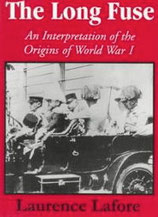The First World War - A sea change for transatlantic migration
The failure of final attempts to avert a catastrophic war
August 1914 and the
demise of open border policies
Effects of the war on migration and
transportation
(For analyses of the war's origins, see Business, Epilogue, and other works listed below)

Business of Transatlantic Migration, p. 261
p. 257: "Mass migration has never since been the major and long-lasting
international transportation business that it was in the decades before 1914."
Recent studies of how “the defining event of the 20th century” happened:
Economist (March 29, 2014) on the origins of “the catastrophe that shaped the modern world,” reviewing Margaret MacMillan, The War that Ended Peace, and Christopher Clark, The Sleepwalkers (both published in 2013):
“Ms MacMillan believes [that it was] Germany, more often than not, that took risks when crises erupted…The three men who had the power to decide between war and peace, the Kaiser, von Moltke and Theobald von Bethmann-Hollweg, the chancellor, saw opportunities rather than threats. ‘A leap in the dark,’ said the chancellor, ‘had its attractions.’ ”
“For Mr. Clark this is too simple. ‘There is no smoking gun in this story, or rather there is one in the hands of every major character.’ [For example] Russian mobilization was reckless, and would have been inconceivable without assurances of more or less unconditional support from France in the Balkans. ‘Russia and France thereby tied the fortunes of two of the world’s greatest powers in highly asymmetric fashion to the uncertain destiny of a turbulent and intermittently violent state.’ ”
Other recent studies of World War I's origins and trajectory:
Stephen Broadberry, Mark Harrison, The Economics of the Great War (2019)
William D. O'Neil, The Plan That Broke the World (2014)
C. Emmerson, 1913: In Search of the World Before the Great War (2013)
Max Hastings, Catastrophe: Europe Goes to War 1914 (2013)
Sean McMeekin, July 1914: The Countdown to War (2013)
William Mulligan, The Origins of the First World War (2010)
Older analyses (but still recommendable):
Niall Ferguson The Pity of War (1999)
Laurence Lafore, The Long Fuse (2nd ed. 1971) (link below)
Barbara Tuchman, Guns of August (1962)

"There is no more cogent explanation of how an assassination by Serbian nationalists in a remote province of the Austria-Hungarian empire could lead, in scarcely five weeks, and step by inexorable step, to a massive invasion of neutral Belgium by three quarters of a million soldiers of the German empire, and to an ultimate worldwide casualty total (counted and recounted repeatedly) of over ten million: a "lost generation" for many countries."
See rest of review by Drew Keeling: here
 Mass migration
as a travel business
Mass migration
as a travel business
